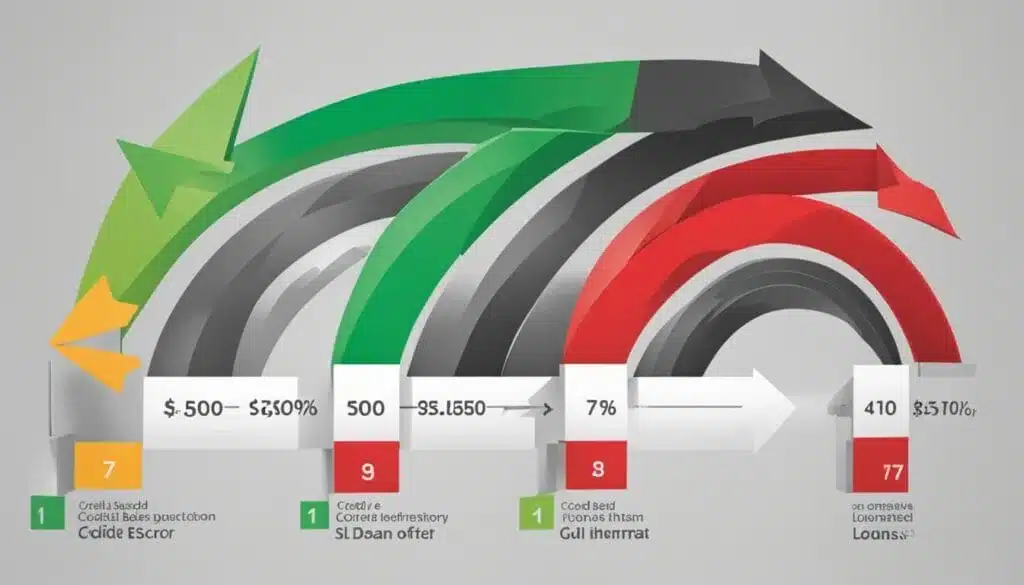Are you in need of a personal loan but worried about your credit score or limited income? Income based loans may be the perfect solution for you. These loans are designed to cater to your financial situation and provide you with manageable repayment options. Whether you have a low credit score or need a loan that aligns with your income, income based loans can provide the financial assistance you need while ensuring peace of mind.
When applying for an income based loan, lenders will assess your income and credit score to determine your eligibility. It’s essential to have proof of income ready and address any issues with your credit history. Don’t let a bad credit score deter you from exploring income based loan options, as there are lenders who specialize in providing loans to individuals with lower credit scores.
By finding the right lender and demonstrating your ability to repay the loan, you can secure an income based loan that fits your budget. With these loans, you can reach your financial goals without the added stress of unmanageable repayments.
Key Takeaways:
- Income based loans are tailored to your financial situation and income level.
- Lenders assess your income and credit score when evaluating your eligibility.
- Providing proof of income and addressing credit issues can increase approval chances.
- There are lenders specializing in income based loans for borrowers with bad credit.
- Finding the right lender is crucial for securing an income based loan that fits your budget.
Understanding Income Based Loans and How They Work
Income based loans are a type of personal loan that provides financial assistance based on your income rather than your credit score. These loans are specifically designed to help borrowers with lower credit scores or limited credit history. When applying for an income based loan, lenders evaluate your income and ability to repay the loan, making it accessible even if you have bad credit.
One key aspect of income based loans is the requirement to provide proof of income. This can include pay stubs, tax returns, or any other relevant documents that demonstrate your financial stability. By presenting concrete evidence of your income, lenders can assess your ability to meet the loan repayment terms.
Income based loans can serve as a viable alternative to payday loans. While payday loans may provide immediate funds, they often come with high interest rates and short repayment terms. In contrast, income based loans offer more favorable terms, enabling borrowers to access the financial assistance they need while improving their credit score over time.
To summarize, income based loans focus on your income rather than your credit score, making them an attractive option for borrowers with bad credit or limited credit history. These loans consider your financial stability and provide manageable repayment options. By providing proof of income and choosing an income based loan instead of a payday loan, borrowers can secure the financial assistance they need while actively working towards improving their creditworthiness.
Finding Lenders That Offer Income Based Loans
When searching for lenders that offer income based loans, it’s important to consider different options. Traditional banks and credit unions may have specific loan programs for borrowers with lower incomes. These lenders will evaluate your credit history and income to determine your eligibility for an income based loan. Online lenders and alternative financial institutions also provide income based loans. These lenders often have more flexible criteria and may be more willing to work with borrowers with bad credit.
When comparing lenders, consider the loan amount, interest rate, repayment terms, and any fees associated with the loan. By exploring different lenders, you can find the best income based loan option for your financial needs.
Credit Unions and Traditional Banks
Credit unions and traditional banks are common sources for income based loans. They may have specific loan programs designed for borrowers with lower incomes. These lenders consider your credit history and income when evaluating your eligibility. Credit unions, in particular, often offer lower interest rates and more flexible repayment terms compared to traditional banks.
Online Lenders and Alternative Financial Institutions
Online lenders and alternative financial institutions are another option for income based loans. These lenders often have streamlined application processes and may be more willing to work with borrowers with bad credit. They may have more flexible criteria and terms, allowing you to find a loan that fits your specific financial situation.
Comparing Lenders
When comparing lenders, it’s important to consider several factors:
- The loan amount: Ensure that the lender offers the loan amount you need to meet your financial requirements.
- Interest rate: Compare the interest rates offered by different lenders to find the most competitive option.
- Repayment terms: Look for lenders with flexible repayment options that align with your budget and financial goals.
- Fees: Review any fees associated with the loan, such as origination fees or prepayment penalties, to determine the overall cost of borrowing.
By carefully comparing lenders and considering these factors, you can find the best income based loan option that meets your financial needs.
Top Lenders That Offer Income Based Loans
When it comes to finding a lender that offers income based loans, there are several options available. These lenders specialize in providing loans that take into account your annual income and credit history. Here are some of the top lenders in this category:
- Avant
- Best Egg
- Happy Money
- Lending Club
- Prosper
- Upgrade
- Upstart
These lenders understand that your financial situation may be unique and are willing to work with borrowers who have bad credit. They offer income based loans with competitive interest rates and flexible repayment terms.
Credit unions are another excellent option for income based loans. They often provide lower interest rates and personalized service. If you belong to a credit union, it’s worth exploring the income based loan options they offer.
When considering these lenders, it’s important to compare the interest rates, loan amounts, and repayment terms to find the best fit for your financial situation. Taking the time to research and choose the right lender can save you money and provide you with the loan that meets your income-based needs.
“I was able to secure an income based loan with a competitive interest rate from one of these lenders. It was a relief to find a lender that understood my unique financial situation and was willing to work with me.” – Satisfied Borrower
How to Prepare for an Income Based Loan Application

Before applying for an income based loan, it’s important to prepare your application to increase your chances of approval. Follow these steps to ensure a smooth loan approval process and improve your chances of receiving an income based loan.
- Check your credit score: Begin by checking your credit score to have a clear understanding of where you stand. Address any errors or issues on your credit report to improve your creditworthiness. Lenders consider your credit history when evaluating your application, so a higher credit score can improve your chances of approval.
- Gather proof of income: Lenders will require proof of your income to assess your ability to repay the loan. Gather documents such as pay stubs, bank statements, or tax returns to provide to the lender. This documentation demonstrates your financial stability and strengthens your loan application.
- Get ready for a credit check: Most lenders will review your credit history as part of the application process. Be prepared for a credit check and ensure there are no surprises on your credit report. Take steps to address any outstanding debts or late payments to improve your creditworthiness.
By being proactive and prepared, you can increase your chances of loan approval and secure an income based loan that fits your financial needs. The table below summarizes the key steps to prepare for an income based loan application:
| Steps to Prepare for an Income Based Loan Application |
|---|
| Check your credit score |
| Gather proof of income |
| Get ready for a credit check |
Alternatives to Income Based Loans for Borrowers with Low Income or Bad Credit
If you have low income or bad credit and are unable to secure an income based loan, there are several alternatives to consider. These alternatives can provide you with the financial assistance you need while taking into account your specific circumstances. Here are a few options to explore:
1. Payday Loans
Payday loans are a short-term option that can provide immediate cash for borrowers with bad credit. However, it’s important to note that payday loans often come with high interest rates and fees, making them an expensive option in the long run. It’s crucial to carefully consider the terms and conditions of payday loans before taking one out.
2. Secured Loans
If you have bad credit, secured loans may be easier to obtain as they require collateral, such as a car or property. By providing collateral, you reduce the lender’s risk, which can increase your chances of approval. However, it’s essential to understand that if you default on the loan, you risk losing the collateral.
3. Debt Consolidation Loans
If you have multiple debts and struggle to manage payments, a debt consolidation loan can be a viable option. This type of loan allows you to combine all your debts into one, making it easier to manage repayments. Debt consolidation loans can help simplify your financial situation and potentially lower your overall interest rate.
Before considering any of these alternatives, it’s crucial to carefully review the terms and conditions of each option. Assess the overall cost, including interest rates and fees, and consider how it fits into your financial situation and ability to repay. Making an informed decision will ensure that you choose the alternative that is best suited to your needs.
| Alternative | Pros | Cons |
|---|---|---|
| Payday Loans | Immediate access to cash | High interest rates and fees |
| Secured Loans | Easier to obtain with bad credit | Risk of losing collateral if defaulted |
| Debt Consolidation Loans | Simplifies financial situation | May not lower overall debt amount |
Remember to carefully consider your financial needs and abilities before pursuing any of these alternatives. It’s always advisable to seek advice from a financial professional who can provide personalized guidance tailored to your specific circumstances.
Understanding the Pros and Cons of Income Based Loans
Income based loans, like any financial product, have their advantages and disadvantages. It’s important to carefully weigh these factors before deciding whether an income based loan is the right choice for your financial needs.
Advantages of Income Based Loans
- Access to funds: Income based loans provide an opportunity for borrowers with lower incomes or bad credit to access funds when they need them.
- Building credit: Making timely payments on an income based loan can help borrowers build or improve their credit score over time, demonstrating responsible borrowing behavior.
Disadvantages of Income Based Loans
- Higher interest rates: Income based loans often come with higher interest rates compared to traditional personal loans. This means that borrowers will end up paying more in interest over the life of the loan.
- Shorter loan terms: Income based loans typically have shorter repayment terms, which can result in higher monthly payments that may be challenging for some borrowers to afford.
- Rigorous application process: To qualify for an income based loan, borrowers may need to provide extensive documentation and meet specific income and credit score requirements set by the lender.
When considering an income based loan, it’s crucial to carefully review the terms and conditions offered by the lender. Assess the interest rate, loan term, and repayment terms to determine if the loan aligns with your financial goals and capabilities.
Now let’s take a closer look at the advantages and disadvantages of income based loans in the table below:
| Advantages of Income Based Loans | Disadvantages of Income Based Loans |
|---|---|
| Access to funds for borrowers with lower incomes or bad credit | Higher interest rates compared to traditional personal loans |
| Opportunity to build or improve credit score with timely payments | Shorter loan terms resulting in higher monthly payments |
| Rigorous application process with specific income and credit score requirements |
Tips for Managing an Income Based Loan

Successfully managing an income based loan requires careful financial planning and budgeting. Here are some tips to help you stay on top of your payments and maintain a healthy credit score:
Determine your borrowing and repayment capacity
Start by assessing your financial situation and determining how much you can comfortably borrow and repay each month. Take into account your monthly income, living expenses, and any other debt obligations you may have. This will give you a clear idea of the loan amount you should consider and the monthly payment you can afford.
Create a budget and stick to it
Once you have determined your monthly payment, create a comprehensive budget that includes all your income and expenses. Allocate a portion of your income to the loan payment and prioritize meeting this obligation. By sticking to your budget, you can ensure that you have enough funds to cover your loan payments.
Make timely payments
It is essential to make all your loan payments on time to avoid late fees and prevent any negative impact on your credit score. Set up reminders or automatic payments to ensure that you do not miss any due dates. Making timely payments will help establish a positive payment history and strengthen your creditworthiness.
Pay off the loan early to save on interest
If possible, consider making extra payments towards your income based loan to pay off the debt sooner. Not only will this save you money on interest costs, but it will also help improve your credit score. Paying off the loan early demonstrates responsible financial management and can boost your creditworthiness.
Pro Tip: Keep in mind that some loans may have prepayment penalties or fees for early repayment. Check with your lender to understand the terms and conditions before making additional payments.
Managing an income based loan effectively is crucial for building a strong credit history and maintaining your financial health. By budgeting wisely, making timely payments, and considering early repayment, you can successfully manage your income based loan while improving your credit score.
Understanding Loan Options Based on Income for Low-Income Individuals

Low-income individuals often face financial challenges when seeking loans. However, there are specific loan options available that are designed to provide financial assistance based on income level. These loan programs are tailored to help individuals with limited income manage their financial obligations effectively.
One of the primary sources of loan options for low-income individuals is credit unions. Credit unions typically offer loan programs that cater to the specific needs of low-income borrowers. These programs often provide lower interest rates, longer repayment terms, and other benefits to ensure that borrowers can manage their loan payments comfortably.
Nonprofit organizations also play a significant role in providing loan options for low-income individuals. These organizations focus on supporting people with limited income by offering loan programs that align with their financial capabilities. These programs may offer flexible repayment options and personalized assistance to help borrowers succeed in managing their loans.
By exploring these loan options, low-income individuals can find programs that best suit their financial needs and goals. It’s essential to carefully compare the terms and conditions of different programs to ensure that the loan is affordable and manageable in the long run.
Benefits of Loan Programs Based on Income
Loan programs based on income level have several advantages for low-income individuals:
- Lower Interest Rates: These loan options often come with lower interest rates compared to conventional loans, making them more affordable for borrowers with limited income.
- Flexible Repayment Terms: Loan programs based on income may offer longer repayment terms, allowing borrowers to spread out their payments over a more extended period. This can ease the financial burden and make the loan more manageable.
- Personalized Assistance: Nonprofit organizations and credit unions that offer these loan programs understand the unique challenges faced by low-income individuals. As a result, they often provide additional support and guidance to help borrowers succeed in managing their loans effectively.
Overall, loan options based on income provide a lifeline for low-income individuals, offering a path to financial stability and empowerment.
Comparing Loan Programs for Low-Income Individuals
To make an informed decision about the best loan program, low-income individuals should consider the following factors:
- Interest Rates: Compare the interest rates offered by different loan programs and choose the one that offers the most favorable terms.
- Repayment Options: Evaluate the repayment options provided by each loan program. Look for flexibility in terms of payment frequency and methods to find an option that aligns with your financial capabilities.
- Loan Amount: Consider the maximum loan amount available through each program to ensure it meets your financial needs.
- Application Process: Review the application process for each loan program to determine the level of complexity and the required documentation. Opt for programs with streamlined processes to simplify your loan application experience.
By carefully comparing loan programs and considering these factors, low-income individuals can make an informed decision and select the program that best fits their financial circumstances and goals.
The Impact of Income Based Loans on Your Credit Score

Taking out an income based loan can have both positive and negative impacts on your credit score. Understanding how these loans affect your credit is important for making informed financial decisions.
On one hand, making timely payments on your income based loan can help improve your credit score over time. By demonstrating responsible borrowing behavior and repaying the loan as agreed, you can show lenders that you are a trustworthy borrower. get income-based This reflects positively on your credit history and can increase your credit score.
On the other hand, if you miss payments or default on the loan, it can have a negative impact on your credit score. Payment history is a significant factor in calculating your credit score, so any missed or late payments will lower your score. It’s crucial to make all loan payments on time to avoid damaging your credit.
In addition to payment history, each time you apply for an income based loan, it results in a credit inquiry. Credit inquiries occur when a lender checks your credit report to assess your creditworthiness. While a single inquiry may have a minimal impact on your credit score, multiple inquiries within a short period can lower your score temporarily.
like best It’s important to be mindful of these factors and manage your income based loan responsibly to maintain and improve your credit score. By making timely payments, avoiding defaults, and minimizing the number of credit inquiries, you can protect your creditworthiness and work towards a positive credit profile.
Key Takeaways:
- Timely payments on income based loans can improve your credit score over time.
- Missed payments or defaults on income based loans can have a negative impact on your credit score.
- Credit inquiries from applying for income based loans can temporarily lower your credit score.
- Manage your income based loan responsibly to protect and improve your creditworthiness.
The Different Types of Personal Loans Based on Income
When it comes to personal loans based on income, borrowers have a variety of options to choose from. These loans are designed to meet the unique needs of individuals with different income levels and financial situations. Understanding the different types of personal loans based on income can help borrowers make informed decisions that align with their specific needs and goals.
1. Payday Loans
Payday loans are short-term loans that are typically repaid on the borrower’s next payday. These loans are an option for individuals who need immediate cash to cover unexpected expenses. Payday loans are based on income and employment, with the loan amount typically determined by the borrower’s income level. While payday loans can provide quick access to funds, they often come with high interest rates and fees, making them a costly borrowing option.
2. Credit Union Loans
Credit unions offer personal loans based on income to their members. These loans are often more favorable than traditional bank loans, as credit unions are not-for-profit organizations focused on serving their members’ best interests. Credit union loans typically have lower interest rates, longer repayment terms, and more flexible lending criteria. Borrowers can apply for credit union loans based on their income and creditworthiness, ensuring that the loan terms are affordable and suitable for their financial situation.
3. Payday Alternative Loans (PALs)
Payday Alternative Loans (PALs) are offered by federal credit unions as a responsible alternative to high-cost payday loans. These loans are designed to provide borrowers with access to funds quickly while promoting financial well-being. PALs typically have lower interest rates and fees than traditional payday loans, making them a more affordable borrowing option. To qualify for a PAL, borrowers must be a member of a federal credit union and meet specific income and credit criteria.
4. Peer-to-Peer Loans
Peer-to-peer (P2P) loans are another type of personal loan based on income. These loans connect borrowers directly with individual investors who fund the loan. Peer-to-peer lending platforms match borrowers with investors based on their income, creditworthiness, and loan requirements. P2P loans often have competitive interest rates and flexible repayment terms. Borrowers can explore different peer-to-peer lending platforms to find the best loan option that suits their income and borrowing needs.
Each type of personal loan based on income has its own terms, interest rates, and repayment options. To determine the right loan option, borrowers should carefully evaluate their financial situation, income stability, and borrowing needs. Comparing different loan options and understanding the terms and conditions will help borrowers make an informed decision that aligns with their financial goals.
| Loan Type | Interest Rate | Loan Term | Repayment Options | Loan Forgiveness |
|---|---|---|---|---|
| Payday Loans | High | Short-term | Single lump sum payment | Not applicable |
| Credit Union Loans | Low | Flexible | Fixed monthly payments | Not applicable |
| Payday Alternative Loans (PALs) | Lower than payday loans | Short to medium-term | Fixed monthly payments | Not applicable |
| Peer-to-Peer Loans | Competitive | Flexible | Fixed monthly payments | Depends on lender |
Also Read : Simplify Life With A Skilled Finance Planner
Conclusion
Income based loans are a valuable solution for individuals with low income or bad credit. These loans are specifically designed to accommodate your financial circumstances and offer manageable repayment options. By partnering with the right lender and showcasing your ability to repay the loan, you can access the funds necessary to meet your needs while also improving your credit score. It is crucial to thoroughly review the terms and conditions of any income based loan before accepting the offer and ensure that it aligns with your budget. With careful financial planning and responsible borrowing, income based loans can prove to be an effective tool for managing your finances and achieving your goals.
FAQs
Q: What is an income-based loan?
A: An income-based loan is a type of personal loan where the lender considers your income and financial situation as a primary factor in determining your eligibility and the terms of the loan.
Q: How do I apply for an income-based loan?
A: To apply for an income-based loan, you can typically do so online or by visiting a lender’s physical location. You’ll need to provide documentation of your income and financial status to support your application.
Q: How do income-based loans work?
A: Income-based loans work by assessing your income to determine how much you can borrow and what interest rate you may be offered. This approach aims to ensure that your loan payments are manageable based on your financial circumstances.
Q: How can I get an income-based personal loan?
A: To get an income-based personal loan, you can explore options with lenders who offer such products. Look for lenders who consider income and affordability alongside credit history when making lending decisions.
Q: What are loans like income-based loans?
A: Loans like income-based loans may include unsecured personal loans that assess your ability to repay based on your income and expenses, as well as installment loans or lines of credit that take into account your financial situation.
Q: How can I find the best income-based loan for me?
A: To find the best income-based loan for your needs, it’s advisable to compare offers from different lenders and consider factors such as interest rates, repayment terms, and any specific eligibility criteria that may apply.
Q: Can I qualify for an income-based loan with poor credit?
A: Depending on the lender, you may still qualify for an income-based loan with poor credit, as some lenders may prioritize your income and ability to repay over your credit score. However, the terms of the loan may differ compared to those offered to borrowers with good credit.
Q: How does receiving an income-based loan impact my credit score?
A: Receiving an income-based loan can impact your credit score both positively and negatively. Making timely payments can boost your credit score, while missing payments or defaulting on the loan can harm your credit standing.
Q: What is the minimum income needed to qualify for an income-based loan?
A: The minimum income needed to qualify for an income-based loan can vary depending on the lender and the specific loan product. Some lenders may have specific income thresholds, while others may evaluate your overall financial situation to determine eligibility.
Q: Do lenders offer income-based loans as secured loans?
A: Some lenders may offer income-based loans as secured loans, meaning you may need to provide collateral to secure the loan. This can potentially result in more favorable loan terms, such as lower interest rates, for borrowers who are able to offer valuable assets as security.





